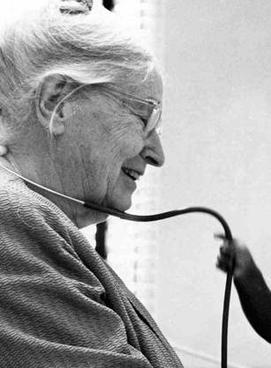Margaret Irving Handy
Margaret Irving Handy (1899–1977) was a pioneering figure in the field of pediatrics and public health, particularly noted for her contributions to the understanding and treatment of pediatric allergies. Over the course of her career, Handy became a respected authority in the medical community, advocating for the importance of specialized care for children with allergies and playing a crucial role in the development of allergy treatments and management strategies during the mid-20th century.
Early Life and Education[edit | edit source]
Margaret Irving Handy was born in 1899, in a period when the medical profession was predominantly male. Despite the societal challenges of her time, she pursued a career in medicine with a focus on pediatrics. Handy received her medical degree from a leading medical school, where she distinguished herself as a dedicated and capable student. Her early interest in the health and well-being of children guided her towards specializing in pediatrics, a field that was still in its infancy in terms of recognizing and treating conditions specific to children.
Career and Contributions[edit | edit source]
After completing her medical education, Dr. Handy embarked on a career that would see her making significant contributions to the field of pediatric medicine. She worked extensively with children suffering from various allergies, a relatively new area of concern in pediatrics at the time. Her work involved not only treating these young patients but also conducting research to better understand the causes and mechanisms of allergic reactions in children.
One of Dr. Handy's key contributions was her emphasis on the need for specialized care for children with allergies. She advocated for the development of treatment protocols that took into account the unique physiological and developmental needs of children. This approach helped to lay the groundwork for what would become the modern field of pediatric allergy and immunology.
Throughout her career, Dr. Handy was also involved in public health initiatives aimed at improving the overall health and well-being of children. She worked to raise awareness about the importance of early detection and treatment of allergies in children, arguing that such measures were crucial for preventing more serious health issues later in life.
Legacy[edit | edit source]
Dr. Margaret Irving Handy's work had a lasting impact on the field of pediatrics and the care of children with allergies. Her pioneering efforts helped to establish the importance of specialized care for allergic conditions in children and contributed to the development of more effective treatment strategies. Today, pediatricians and allergists continue to build upon the foundations laid by Dr. Handy and her contemporaries.
Dr. Handy's legacy is also evident in the ongoing efforts to improve public health policies related to children's health, particularly in the areas of allergy prevention and management. Her work serves as a reminder of the importance of dedicated specialists in addressing the unique health needs of children.
See Also[edit | edit source]
Transform your life with W8MD's budget GLP1 injections from $125 and up biweekly
W8MD offers a medical weight loss program NYC and a clinic to lose weight in Philadelphia. Our W8MD's physician supervised medical weight loss centers in NYC provides expert medical guidance, and offers telemedicine options for convenience.
Why choose W8MD?
- Comprehensive care with FDA-approved weight loss medications including:
- loss injections in NYC both generic and brand names:
- weight loss medications including Phentermine, Qsymia, Contrave, Diethylpropion etc.
- Accept most insurances for visits or discounted self pay cost.
- Generic weight loss injections starting from just $125.00 for the starting dose
- In person weight loss NYC and telemedicine medical weight loss options in New York city available
Book Your Appointment
Start your NYC weight loss journey today at our NYC medical weight loss, and Philadelphia and visit Philadelphia medical weight loss Call (718)946-5500 for NY and 215 676 2334 for PA
Search WikiMD
Ad.Tired of being Overweight? Try W8MD's NYC physician weight loss.
Semaglutide (Ozempic / Wegovy and Tirzepatide (Mounjaro / Zepbound) available. Call 718 946 5500.
Advertise on WikiMD
|
WikiMD's Wellness Encyclopedia |
| Let Food Be Thy Medicine Medicine Thy Food - Hippocrates |
Translate this page: - East Asian
中文,
日本,
한국어,
South Asian
हिन्दी,
தமிழ்,
తెలుగు,
Urdu,
ಕನ್ನಡ,
Southeast Asian
Indonesian,
Vietnamese,
Thai,
မြန်မာဘာသာ,
বাংলা
European
español,
Deutsch,
français,
Greek,
português do Brasil,
polski,
română,
русский,
Nederlands,
norsk,
svenska,
suomi,
Italian
Middle Eastern & African
عربى,
Turkish,
Persian,
Hebrew,
Afrikaans,
isiZulu,
Kiswahili,
Other
Bulgarian,
Hungarian,
Czech,
Swedish,
മലയാളം,
मराठी,
ਪੰਜਾਬੀ,
ગુજરાતી,
Portuguese,
Ukrainian
Medical Disclaimer: WikiMD is not a substitute for professional medical advice. The information on WikiMD is provided as an information resource only, may be incorrect, outdated or misleading, and is not to be used or relied on for any diagnostic or treatment purposes. Please consult your health care provider before making any healthcare decisions or for guidance about a specific medical condition. WikiMD expressly disclaims responsibility, and shall have no liability, for any damages, loss, injury, or liability whatsoever suffered as a result of your reliance on the information contained in this site. By visiting this site you agree to the foregoing terms and conditions, which may from time to time be changed or supplemented by WikiMD. If you do not agree to the foregoing terms and conditions, you should not enter or use this site. See full disclaimer.
Credits:Most images are courtesy of Wikimedia commons, and templates, categories Wikipedia, licensed under CC BY SA or similar.
Contributors: Prab R. Tumpati, MD



